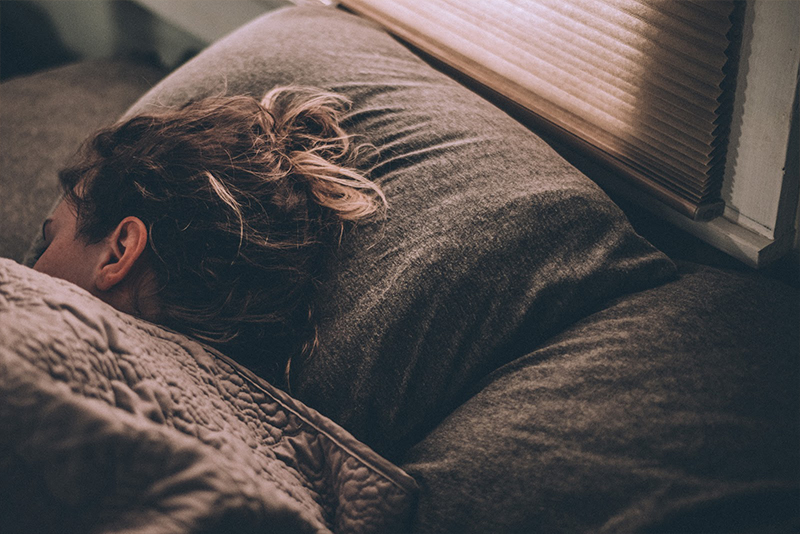How To Sleep – Sleep is a fundamental part of our day-to-day lives. Humans spend about a third of their life snoozing. During sleep, the body regenerates itself. However, many of us seem to forget the value of sleep as bedtimes creep later and later. Unfortunately, this has many side effects and one of them is fatigue and lethargic behavior especially when you sleep late and wake early. This pattern can wreak havoc on your health and lead to all kinds of complications. In order to sleep, certain changes can make all the difference towards improving your quality and quantity of sleep.
How To Sleep
How To Get To Sleep
How To Sleep Deep
How To Sleep With A Cold
How To Sleep While Pregnant

How To Sleep – Adequately
There is a debate on how many hours of sleep are necessary to function normally during the day. Some say eight hours of sleep are required while others boast that they can be productive when they sleep for just six hours. In this busy world, sleeping for six to seven hours has become the norm. However, sleeping seven hours or less can put you at risk for chronic sleep deprivation [1].
According to the National Sleep Foundation, a nonprofit organization that aims to promote getting enough sleep, the amount of sleep required per individual varies. Some need more sleep while others need fewer hours [2].
How To Sleep – Below are the National Sleep Foundation’s recommended number of hours for each age group:
-
- Newborns (0 to 3 months) – Average sleep recommendation is between 14 to 17 hours of sleep per day. This has recently changed compared to the 12 to 18 hours of sleep previously recommended.
- Infants (4 to 11 months) – Average sleep time is 12 to 15 hours.
- Toddlers (1 to 2 years) – Toddlers should get an average of 11 to 14 hours of sleep per day.
- Preschoolers (3 to 5 years) – For preschoolers, 10 to 13 hours of sleep are recommended.
- School children (6 to 13 years) – School kids should get 9 to 11 hours of sleep as much as possible.
- Teenagers (14 to 17 years) – A teenager should get 8 to 10 hours of sleep per day.
- Younger Adults (18 to 25 years) – This is a new category that the National Sleep Foundation has put together. They advise that younger adults get 7 to 9 hours of sleep.
- Adults (26 to 64 years) – These sleep hours remain the same as those for young adults.
- Older Adults (65+ years) – Average sleep is around 7 to 8 hours.
How To Sleep – There are other factors that may require you to sleep longer:
- Aging – Older adults may sleep an average of 7 to 9 hours per day, but this does not mean that they will always be able to get this in one block. Keep in mind that as you age, sleep patterns change, and there may be periods of light, short sleep which is why naps are advised [3].
- Pregnancy – Changes in your body, while you are pregnant, can also cause you to sleep longer. Pregnant women may wake frequently at night as the pregnancy progresses.
- Quality of Sleep – Aside from quantity, the quality of sleep that you are getting is also important. If your sleep is constantly interrupted, longer and better sleep will be required.
- Sleep Deprivation – Bodies are deprived of much-needed sleep when the quality and quantity of necessary sleep are not achieved. This means that your body will seek a longer sleep time.

How To Get To Sleep
Many of us find it difficult to fall asleep at night. An overactive mind and daily stressors are generally to blame. These bombardments can lead to insomnia which affects millions of people around the world.
In other cases, certain sleep disorders such as sleep apnea can affect sleep. Sleep apnea causes snoring and blocked airways to the point that sufferers wake at night because they are unable to breathe.
If you want to get the sleep required to function normally, these tips might be a good place to start.
- Do something for 10 minutes. If you find yourself unable to go back to sleep, get out of bed and do an activity for 10 minutes without turning on any screens. Keep in mind that the blue light that is being emanated by screens keeps melatonin at bay which inhibits sleep [3].
- Don’t clock-watch. Another way to sleep at night is to hide any clocks or timepieces in view while you are in bed. Keeping track of the time as you find yourself unable to sleep causes stress which leads to more sleep being missed [5].
- Find the right temperature for bedtime. It is always a good idea to find the optimal body temperature that is conducive to sleep. Start with purchasing bedding that is breathable and comfortable so that you will be able to fall asleep easily [6].

How To Sleep – Deep
Sleep problems often happen when we are not getting enough sleep or the quality of sleep is poor. Daytime sleepiness can be a product of not getting enough sleep at night. Even when you fall asleep, it does not mean that you are getting sound sleep. If you have slept for 7 or 8 hours and are still tired you may be lacking deep quality sleep.
How To Sleep – Here are a few tips that sleep experts recommend for better quality sleep.
- Follow a sleep schedule. If you want to improve your sleep, make it a point to go to sleep at the same time every night. Having a bedtime routine trains your body to immediately rest as it approaches the designated time of sleep [9].
- Learn to wind down. Our brains remain active even when we are in bed if we are exposed to too many stimuli. Instead of browsing the net and using your smartphone, turn off the gadgets and prepare your body for bed. Getting into a more relaxed state can help you drift into deep sleep.[10]
- Avoid naps – If you want to sleep better at night, make it a point to skip naps during the day. For those who need to take naps, do it early in the day, and limit it to just 20 minutes [7].
- White noise – Another way to trick yourself into sleeping better is to add some noise to your surroundings. If your sleep is constantly interrupted by your neighbor’s loud music or barking dog, drown them all out with white noise. There are apps that help achieve this [8].
Keep in mind that when your circadian rhythm is disrupted, it will be difficult for you to find a good night’s rest.

How To Sleep – Better With A Cold
When stricken with flu, the common cold, a clogged nose, or a sore throat, sleeping is not easy. When it is difficult to breathe, falling asleep is a real challenge. Fortunately, there are ways in which you can slip into sleep mode even when you are sick.
Here are a few tips that can help you stick to your sleep-wake cycle even when you are feeling poorly.
- Add more pillows. When your nose is stuffy, sleeping with just one pillow is not recommended. The pressure on your sinuses is relieved greatly when you raise your head. Adding two or more pillows under your head helps drain the sinuses to allow a clear respiratory pathway [11].
- Humidifier helps. Another way to sleep better is to turn on a humidifier. Extra moisture in the bedroom clears a clogged nose. Use distilled water in the humidifier, and clean the machine regularly to prevent dirt from being diffused in your room. This can make breathing more difficult [12].

How To Sleep While Pregnant
Expectant mothers know that their sleep cycle will surely be disrupted as soon as the baby is born. However, pregnancy can also affect the quality of sleep for many expectant moms.
There are many factors that may disrupt REM sleep during pregnancy such as bathroom runs, belly kicking, and heartburn to name a few. It is understandable that pregnant mothers need as much shut-eye as possible.
How To Sleep – If you find yourself wide awake in bed, these tips are worth trying.
- Hydrate three hours before bedtime. It is important to stay hydrated all the time, but if the constant urge to urinate causes you to wake in the middle of the night, prohibit any liquid intake three hours before bedtime. If you do have to use the restroom, instead of turning on the lights in your room, use a nightlight. The brighter the light, the wider awake you become which makes it difficult to go back to bed. [13] Keep in mind that bright lights and blue lights prevent the body from producing melatonin, the sleep hormone.
- Move to your side. Another tip to sleep better at night is to sleep on your side, specifically your left side. This reduces the pressure being placed on the uterus which, in turn, allows for easier breathing. Another plus to sleeping on your side is that it reduces pressure on your back which is a common sore spot for pregnant women [14].
- Meditation. If your body is keeping you from getting a good night’s sleep or you find yourself wide awake at night, practice sleep training techniques such as deep breathing and meditation. There are many meditation techniques such as guided imagery, muscle relaxation, and regulating your breathing [15].
- Invest in a lot of pillows. Pregnant women need to be comfortable. Some pregnant women prefer to have lots of pillows around them, under their heads, under their arms, at the small of their back, and under their belly especially when they are sleeping on their sides. Make your bed a comfortable place as can be [16]. There is no doubt that sleep should be part of your daily routine. Going from non-REM sleep to REM sleep repairs and invigorates your body so that you awaken refreshed and energized. Good sleep hygiene is also advantageous in the long run.
As appealing as foregoing sleep is when you have tons to do, make adequate sleep a part of your daily routine. Making sleep a priority may help reduce the incidence of sleep-related health issues.
How To Sleep Resources:
[1] Help Guide; Sleep Needs, Melinda Smith, M.A., Lawrence Robinson, and Robert Segal, M.A., June 2018.
[2] Time; Here’s How Much Experts Think You Should Sleep Every Night, Alexandra Sifferlin, February 2, 2015.
[3] Mayo Clinic; How many hours of sleep are enough for good health?, Eric J. Olson, MD, April 06, 2016.
[4] Huffpost; 15 Science-Backed Ways To Fall Asleep Faster, Sara Schwartz, August 28, 2015.
[5] How Sleep Works; 21 Weird Ways to Fall Asleep That Actually Work.
[6] Mirror; Unable to sleep? The best ways you can trick yourself into dozing off, Kim Jones, August 18, 2018.
[7] WebMD; 20 Tips for Better Sleep, William Blahd, MD, October 06, 2016.
[8] The Loop; Five super-easy hacks to help you fall asleep in five minutes flat, Matilda Miranda, March 15.
[9] Prevention; You’ll Be Sleeping Better With These 20 Tips, Teresa Dumain, April 07, 2014.
[10] NSF; Healthy Sleep Tips.
[11] WebMD; 7 Sleep Tips for a Cold or the Flu, Neha Pathak, MD, September 05, 2017.
[12] WikiHow; How to Sleep With a Cold.
[13] Parents; You need sleep, but your burgeoning belly didn’t get the memo. Snooze comfortably with these bedtime solutions, Kathleen M. Reilly, Jeannette Moninger.
[14] The Bump; 10 Ways to Get Better Sleep, Sarah Yang.
[15] Baby Center; The basics of good sleep during pregnancy.
[16] Reader’s Digest; Best Health, 19 ways to sleep better when you’re pregnant.




